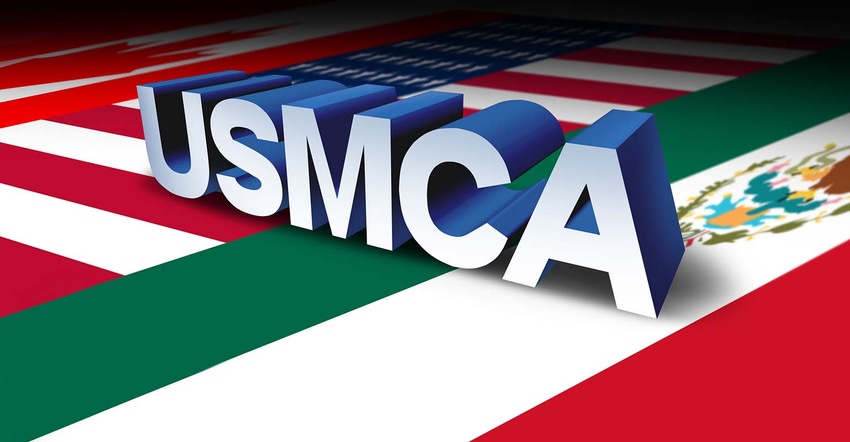December 19, 2019

The House has passed the United States-Mexico-Canada Agreement by a 385 to 41 vote.
Here's how USMCA builds on trade relationships established in the North American Free Trade Agreement, according to American Farm Bureau Federation:
The agreement is expected to increase U.S. ag exports by $2 billion and result in a $65 billion increase in gross domestic product.
The agreement will provide new market access for American dairy and poultry products while preserving the zero-tariff platform on all other ag products. The agreement gives U.S. dairy products access to an additional 3.6% of Canada’s dairy market – even better than what was proposed in the Trans-Pacific Partnership trade agreement.
U.S. wheat will receive fairer treatment, thanks to Canada’s agreement to grade our wheat no less favorably than its own.
Mexico and the United States have also agreed that all grading standards for ag products will be non-discriminatory.
Additional provisions enhance science-based trading standards among the three nations as the basis for sanitary and phytosanitary measures for ag products, as well as progress in the area of geographic indications.
The agreement also includes measures that address cooperation, information sharing and other trade rules among the three nations related to agricultural biotechnology and gene editing.
Agriculture Secretary Sonny Perdue added this information:
Canada and Mexico are the first and second largest export markets for United States food and agricultural products, totaling more than $39.7 billion food and agricultural exports in 2018. These exports support more than 325,000 American jobs.
All food and agricultural products that have zero tariffs under the North American Free Trade Agreement will remain at zero tariffs. Since the original NAFTA did not eliminate all tariffs on agricultural trade between the United States and Canada, the USMCA will create new market access opportunities for United States exports to Canada of dairy, poultry, and eggs, and in exchange the United States will provide new access to Canada for some dairy, peanut, and a limited amount of sugar and sugar-containing products.
For the first time, the agreement specifically addresses agricultural biotechnology – including new technologies such as gene editing.
The agreement institutes a more rigorous process for establishing geographical indicators and lays out additional factors to be considered in determining whether a term is a common name.
The three countries agree to strengthen disciplines for science-based measures that protect human, animal, and plant health while improving the flow of trade.
U.S. poultry producers will have expanded access to Canada for chicken, turkey, and eggs.
The three countries agree to avoid technical barriers to trade through non-discrimination and transparency regarding sale, distribution, labeling, and certification of wine and distilled spirits.
The Senate is expected to take up the USMCA in January. Mexico has approved the agreement and Canada is likely to hold a vote in January.
Here's some of what ag groups are saying.
“Corn farmers have been working toward this vote for nearly a year, sending emails, having meetings and making phone calls to their representatives in support of USMCA," said National Corn Growers Association President Kevin Ross. "All of agriculture should be incredibly proud to see these efforts pay off with such a strong, bipartisan vote. We wouldn’t be at this stage in the ratification process without the hard work of individual farmers across the country. Ratifying USMCA has been NCGA’s top legislative priority because Mexico and Canada are the U.S. corn industry’s largest, most reliable markets."
“With today’s bipartisan House vote to ratify the USMCA, we’re another step closer to securing a North American trade deal that works for U.S. farmers, equipment manufacturers, and hardworking American families,” said Dennis Slater, president of the Association of Equipment Manufacturers.
“USMCA will bring tangible benefits to the U.S. dairy industry by upgrading trade rules, opening the Canadian market to U.S. dairy exports and preserving our valuable market access in Mexico,” said Tom Vilsack, president and CEO of the U.S. Dairy Export Council.
“Agriculture desperately needed a win for economic recovery, and passing the USMCA was that win,” said National Association of Wheat Growers President and Lavon, Tex., farmer Ben Scholz.
"Ratification of USMCA is an important step in solidifying trade relations with Mexico and Canada, which are critical destinations for U.S. pork, beef and lamb," said U.S. Meat Export Federation President and CEO Dan Halstrom. "This agreement will bolster the United States' position as a reliable supplier to two leading markets that currently account for about one-third of all U.S. red meat exports."
“We are hopeful that USMCA can be a model for future U.S. trade agreements, as these modernized rules will be a strong guide for addressing continuing issues," said American Farm Bureau Federation President Zippy Duvall. "We urge the Senate to quickly approve the USMCA.”
“Today’s vote brings us one step closer to finalizing USMCA and securing a more certain future for America’s farmers and ranchers,” said Jim Mulhern, president and CEO of National Milk Producers Federatioon. “It is imperative that the Senate act now to finalize USMCA.”
“We express our thanks to the House of Representatives for this momentous act," said American Soybean Association President and Minnesota farmer Bill Gordon. "We now look to the Senate to take up and pass USMCA in early 2020.”
The Organization for Competitive Markets issued the following statement, "OCM opposes the ratification of USMCA. Our concern is not so much for what USMCA does, but rather what it fails to do. NAFTA provided windfall profits for global corporations at the expense of farm and ranch families, and USMCA does not tilt the scales of justice back. It does not address excessive agriculture and food market concentration, the overproduction of milk, the disparity in grain pricing, nor does it provide the U.S. with mandatory Country of Origin Labeling authority."
About the Author(s)
You May Also Like




